Rose Hips Benefits: 12 Proven Health And Beauty Perks
From boosting digestion to aiding circulation - explore how rosehips can support your health.

Image: iStock
The benefits of rose hips go beyond what you have imagined them to be. They are rich in vitamin C and bioactive compounds like phenols, lycopene, and ellagic acid. These false fruits of wild rose plants are used in traditional medicine, and their benefits have been extensively researched. This article explores the 12 amazing benefits of these nutrient-rich fruits and a few easy recipes to try. Read on!

 Know Your Ingredient: Rosehip
Know Your Ingredient: RosehipWhat Is It?
A bright red or orange fleshy bulb that grows on the rose plant and contains rose seeds.
What Are Its Benefits?
It helps reduce skin damage, manage blood sugar levels, and promote kidney health.
Who Can Use It?
Anybody can consume it except people on estrogen and blood thinning medications.
How Often?
You can take 5-10 gms of rose hips every day.
Caution
Avoid consuming rose hips if you are pregnant or breastfeeding. Excess consumption may increase the risk of developing kidney stones, heartburn, and nausea.
In This Article
What Are Rose Hips?

An accessory fruit of the rose plant, the rose hip is also called rose hep or rose haw. Other names include dog rose fruit, hipberries, hip fruit, hop fruit, and brier hip. It is usually red or orange, but in some species, the color ranges from dark purple to black.
The fruit begins to form in early summer, and ripens in the late summer through autumn. It is popularly used to make the traditional Hungarian fruit brandy called palinka, which is well known in countries sharing Austro-Hungarian history.
The rose hips come in two varieties – Rosa gallica and Rosa canina, which are native to Asia, Europe, and North Africa. The fruit is usually harvested either about a week after the first frost or in late fall.
Rose hips are known for their traditional use for both culinary and medical purposes. We have discussed this in detail below. Keep reading.
Key Takeaways
- Rose hip contains vitamin C that may improve immunity and help the body absorb iron better.
- The nutrients in rose hips may help lower cholesterol, manage diabetes, aid digestion, and regulate blood pressure.
- The vitamins and active compounds in rose hips may stimulate collagen production and improve overall skin health.
- Add rose hips to your diet with recipes like rose hip jam, soup, syrup, and tea.
Traditional Uses Of Rose Hips
Rose hips have long been valued for their culinary and medicinal uses. Their acidic flavor makes them a popular ingredient in jams, jellies, syrups, and herbal teas. Rose hips are used medicinally because of their high vitamin C concentration, which boosts immunity and treats respiratory conditions, including colds. They have been traditionally used for treating arthritis and joint discomfort because of their anti-inflammatory qualities. Rose hips are used in oils and creams for skin care since it’s thought to moisturize and even out skin tone. In addition, they have digestive benefits, are antioxidants, and are utilized in conventional treatments for UTIs and overall health.
Let’s now see what research and science says about the benefits of rose hip. Read on.
What Is Rosehip Good For?
The fruit has a number of uses. Primarily, it has its use in preventing a number of ailments – some of those include osteoarthritis and stomach ailments (1). It can also be used as a diuretic and mild laxative. The fruit is also used to reduce thirst and other types of gastric inflammationi A collective term used to describe several ailments that cause the inflammation of the stomach lining. (2).
Before we proceed to the actual rosehips benefits, let’s first have a glance at the nutritional value of this fruit.
Rose Hips Nutrition Facts
Here is the detailed information about rosehip nutritional benefits.
Nutrient | Unit | 1 Value per 100.0g | 1.0 cup 127g |
| Proximates | |||
|---|---|---|---|
| Water | g | 58.66 | 74.50 |
| Energy | kcal | 162 | 206 |
| Protein | g | 1.60 | 2.03 |
| Total lipid (fat) | g | 0.34 | 0.43 |
| Carbohydrate, by difference | g | 38.22 | 48.54 |
| Fiber, total dietary | g | 24.1 | 30.6 |
| Sugars, total | g | 2.58 | 3.28 |
| Minerals | |||
| Calcium, Ca | mg | 169 | 215 |
| Iron, Fe | mg | 1.06 | 1.35 |
| Magnesium, Mg | mg | 69 | 88 |
| Phosphorus, P | mg | 61 | 77 |
| Potassium, K | mg | 429 | 545 |
| Sodium, Na | mg | 4 | 5 |
| Zinc, Zn | mg | 0.25 | 0.32 |
| Vitamins | |||
| Vitamin C, total ascorbic acid | mg | 426.0 | 541.0 |
| Thiamin | mg | 0.016 | 0.020 |
| Riboflavin | mg | 0.166 | 0.211 |
| Niacin | mg | 1.300 | 1.651 |
| Vitamin B-6 | mg | 0.076 | 0.097 |
| Vitamin A, RAE | µg | 217 | 276 |
| Vitamin A, IU | IU | 4345 | 5518 |
| Vitamin E (alpha-tocopherol) | mg | 5.84 | 7.42 |
| Vitamin K (phylloquinone) | µg | 25.9 | 32.9 |
Rosehips Benefits
Rosehips benefits are many and the reason that they are so popular is because they are highly effective in treating a wide variety of health conditions. Let us see what are they.
1. May Help Prevent Cancer And Other Chronic Diseases

According to one study, rose hip extract had reduced the growth and migration of breast cancer cells (3). In the study, the highest concentrations of rose hip extract had reduced the migration of breast cancer cells by as much as 45 percent. The rosehip extract uses include prevention of cancerous growth in the brain, a place where the breast cancer cells tend to spread to.
Another Serbian study focuses on the phytochemicals present in rose hip tea. The polyphenols present in the fruit may prevent the human cancer cells from proliferating (4).
According to a Spanish study, rose hips could be active components in functional diets that can help prevent colorectal cancer (5). The fruit also has an anti-inflammatory action, which contributes to its cancer-preventive properties (6). Rose hips contain certain bioactive compounds like phenols, ascorbic acid (vitamin C), beta-carotene, tannins, and pectins – all of which help curb oxidative stressi A condition caused by an imbalance between the creation and buildup of oxygen radicals in cells and the ability to detoxify them. , which can otherwise lead to cancer (7).
A Japanese study also stressed on the efficacy of the fruit to suppress inflammation and the resultant cancer cell proliferation (8). One major flavonoid in rose hip, called tiliroside, possesses commendable anti-inflammatory action.Though the rose hip extract is safe, one thing must be kept in mind – patients who are taking rose hip along with some medication must exercise extra care. This is becase rose hips may interact with prescription and over-the-counter drugs (9).
Rose hips also contain other active compounds called carotenoids, which are known to decelerate the expansion of certain forms of tumor (10). Rose hip extract was also found to prevent epithelitisi A condition caused by an inflammation of the mucosal epithelium (cells that secrete mucus to protect your body) due to trauma. , which could be caused by radiotherapy in patients with head and neck cancer (11). The fruit has also been observed to stop and even reverse the growth of certain cancers (12).
Rose hips, surprisingly, also contain lycopene (the compound that renders them their red color). Lycopene is popular for its anticancer activity. It stimulates the communication between cells, the damage of which leads to the growth of cancerous tumors (13).
2. Lower Cholesterol
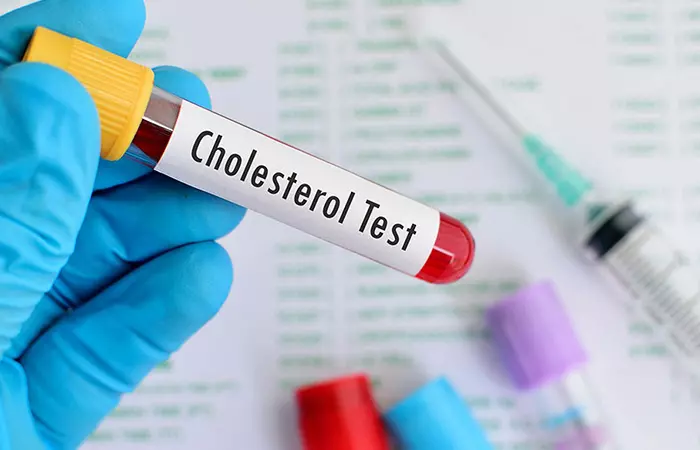
Regular intake of rose hip extract has been linked to lowered cholesterol levels (14). This cholesterol-lowering effect may be related to its antioxidant properties (15). The fruit is particularly effective in obese patients – patients who consumed a drink made of rose hip powder daily for six weeks saw a significant drop in their total blood cholesterol levels by as much as 5 percent. This drop can even reduce the risk of heart disease by 17 percent. Rose hip can also be used as a safe alternative to anti-cholesterol drugs (like statins) that might have side effects (14).
3. Additional Vitamin C Benefits
Rose hips are so full of vitamin C that the nutrient deserves a special mention. By the way, did you know that the fruit contains 60 times the vitamin C found in an orange?
One of the major benefits of vitamin C is potential stimulation of collagen production in the body. Collagen is a protein that forms the connective tissue in the body. The vitamin also treats inflammation and improves immunity. It prevents scurvy, a disease that can cause muscle weakness, joint pains, rashes, and tooth loss (16).
The vitamin C in rose hips also helps maintain the health of blood vessels. And because of the high levels of this vitamin, even the American Indian tribes had used the tea from the fruit to treat respiratory ailments (17).
Here’s a quick tip for you – when it comes to cooking rose hips (or any food rich in vitamin C), never use aluminum pans or utensils as they can destroy the vitamin in the food (18).
Vitamin C in rose hips also helps your body absorb iron better (19). Iron has several benefits, the major one being preventing anemia and keeping your blood healthy. And yes, vitamin C may help prevent and shorten the duration of cold and flu symptoms. So, you don’t have to worry even if the seasons are changing.
4. Help Prevent Rheumatoid Arthritis
In one study, patients who received rose hip showed greater improvements in arthritic conditions (20). In another study conducted back in 2008, rose hip powder had reduced pain in the hips, joints, and knees by about a third (21). The study was conducted on 300 osteoarthritisi A type of arthritis that occurs due to the aging and deterioration of the malleable bone-end tissue. patients.
Rose hips also contain the fatty acid GOPO, which, as per experts, is the plant version of fish oil. And GOPO could be one of the contributing factors for the fruit’s anti-arthritic properties. Rose hip extract pills were found to reduce arthritic pain by as much as 90 percent (22). In fact, one popular arthritic medicine called LitoZin is made from processed ground rose hips (23).
Another important quality about rose hips (with respect to treating arthritic symptoms) is they don’t have ulcerogenic effects like certain other medications (24).
5. Can Help Manage Diabetes
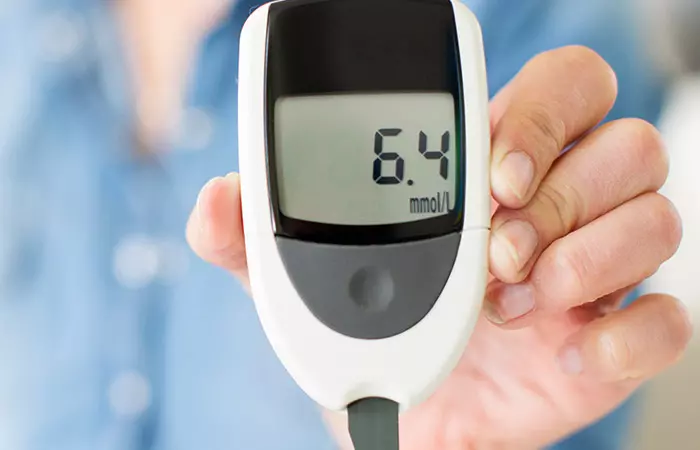
Certain animal studies hint that rose hip can lower blood sugar levels and aid in diabetes treatment. Research suggests it does so by modifying liver fat metabolism, which contributes to improved glucose tolerance and cholesterol levels (25). Mice induced with rose hip powder showed better glucose tolerance than mice that weren’t – and this indicates a similar possibility in humans.
6. Good For The Heart
In one study conducted by Sweden’s Department of Experimental Medical Science, intake of rose hip powder was found to significantly reduce the risk of cardiovascular disease. It did so by regulating blood pressure, reducing inflammation, and promoting cholesterol clearance, which helped prevent plaque buildup in arteries (26).
The flavonoids and antioxidants in rose hip also protect the body against heart disease (6).
7. Treat Inflammation
This could be similar to what we have seen about rose hip and its favorable effects on osteoarthritis. As per one Denmark study, regular intake of rose hip can reduce the levels of C-reactive protein, a substance produced by the liver that increases in concentration with an increase in inflammation (27).
Also, certain studies state that the anti-inflammatory properties of rose hip are attributed to its seed, and not its shell (28). The anti-inflammatory properties of rose hips also help prevent cartilage erosion (29).
8. Aid Digestion
As reported by the University of Michigan, the skin of the rose hip fruit can help prevent stomach pain and helps improve digestive system health and even treat other digestive problems (30). This may be because rosehip is rich in fiber that aids digestion by preventing constipation and promoting a healthy gut (31).
9. Regulate Blood Pressure
According to one report by the European Journal of Clinical Nutrition, intake of rose hip may result in a small but significant drop in blood pressure levels. This may be due to the antioxidants found in rose hips. This may further promote better heart health (32). But make sure you check with your doctor if you are on BP medications.
10. Improve Skin Health

Rosehip oil benefits your skin in numerous ways, as it is packed with nutrients. The oil from the rose hip fruit penetrates deep into the skin layers and improves skin health. The vitamin C, as we saw, stimulates the production of collagen and thus has anti-aging effects on the skin. The fruit also contains vitamin A that improves the moisture content of the skin (6).
Rose hip oil also combats the UV damage by the sun. The antioxidants in the fruit improve skin texture and tone, and help treat pigmentation. The essential fatty acids in rose hip oil also prevent scarring and encourage skin regeneration (6). But remember, the oil must not be directly applied to acne.
Celebrities like the Duchess of Cambridge and Victoria Beckham (amongst a few others), as per reports, use rose hip oil to keep their skin free from blemishes (33). The oil from the fruit is also good for correcting dark spots and treating dry or itchy skin.
According to a Japanese study, rose hip, if taken orally, could be used as a skin-whitening agent (34).
Rose hip also contains quercetin, which has been found to prevent melanoma, a serious form of skin cancer. A Thailand study states that using rosehip powder for skin can improve aging-induced skin conditions (35).
You follow this DIY rosehip face serum recipe to take advantage of its excellent skin care properties.
11. Enhance Blood Circulation
Rose hip tea, when brewed, may enhance blood circulation. This may be because rose hips help prevent the formation of plaque in the arteries. When arteries remain flexible and free of plaque, blood can circulate more efficiently (36).
12. Improve Kidney Health
According to a report by the U.S. National Library of Medicine, rose hip can be used to treat kidney disorders. In studies with animals, giving them rose hip extracts reduced kidney damage by lowering oxidative stress, which is the damage caused by free radicals. It also helped reduce inflammation, another major cause of kidney injury (6).
Now that you saw what are the benefits of rose hips, how about checking out some nutritious rose hip recipes?
 Trivia
TriviaApart from the above-mentioned benefits, rosehip may also help in anxiety reduction, provide stress relief, aid in weight loss, and improve eye health, memory enhancement, liver health, and brain function (35). Now that you see what are the benefits of rose hips, how about checking out some nutritious rose hip recipes?
Rose Hip Recipes
When choosing rose hips for the following recipes, go for fresh ones that are firm, plump, and brightly colored. Also, always choose organic or wild-harvested varieties to avoid pesticides. For dried rose hips, look for airtight, light-proof packaging to preserve freshness. Now, let’s dive into the recipes.
1. Rose Hip Jam
What You Need
- 1 cup of rose hips, trimmed and seeded
- 2 sets of ¾ cup of water
- 3 tablespoons of lemon juice
- 2 cups of sugar
- 1 package of powdered fruit pectin
Directions
- Add the rose hips, water, and lemon juice to a blender. Blend for about 15 seconds or until the mixture is smooth. While the blender is running, add the sugar. Blend for about 30 seconds until the sugar is dissolved.
- Stir the pectin into the second ¾ cup of water. Add to a saucepan and bring to a boil. You can boil hard for about a minute. Slowly pour this into the rose hip mixture, and blend for about 30 seconds.
- Pour the jam into small containers (they must have lids). Store them in the refrigerator. If you are not going to use the jam in a few days, you can store it in the freezer (up to a year).
2. Rose Hip Soup
What You Need
- 1 cup of fresh rose hips
- 2 liters of water
- 1 liquid quart of rose hip for pulp for each liter of water
- 1 ½ tablespoons of potato flour
- 1 ½ tablespoons of sugar
- ¼ cup of almonds
Directions
- Rinse the rose hips and crush them once dried.
- Boil them in water until they turn soft.
- Press them through a colander. Measure the pulp. If necessary, you can dilute with water.
- Bring the pulp to a boil and add sugar. If it is too tart, you can add more sugar.
- Mix the potato flour with some cold water.
- As you stir, thicken the soup and bring it to a boil.
- Add the blanched and shredded almonds.
3. Non-Alcoholic Rose Hip Peach
What You Need
- 4 tablespoons of dried rose hips
- 4 cups of water
- 2 tablespoons of sugar
- 1 sliced lemon
- 15 ml of peach syrup
- 5-6 fresh mint leaves
- 5 ice cubes
- 150 ml of soda
Directions
- Add the dried rose hips to water and boil it for 15-20 minutes.
- Strain the tea into a c
- Add sugar into a saucepan and let it caramelize over low flame. Stir continuously until fully dissolved.
- Set it aside for 10 minutes and allow it to cool down a bit.
- Transfer the caramelized sugar into a glass.
- Add the peach syrup and mix it well.
- Add the ice cubes, soda, lemon slice, and garnish with mint leaves.
Sally, a chef and blogger, shared her experience of improvising a rosehip and strawberry cake. Regarding the treatment of the rosehips, she shares, “Rosehips are a bit too tangy to add straight to a cake so candying was the perfect option…. I did try cutting them and taking out the seeds beforehand but the end result was a hard, dry, withered bit of rosehip. Boiling them in water to soften and then in sugar syrup just made them too soft. Keeping them whole retains some of the juices and in the end you get a fuller flavour and a slightly juicy bite (i).”
Rose hip has a few fascinating uses too!
Uses Of Rose Hip
Let’s talk about rose hip oil uses for your overall health.
- Rose Hip Syrup
According to certain personal records, rose hip syrup can help treat arthritis pain. And in addition to vitamin C, the syrup also boosts vitamin D intake. So, if you are someone who has minimum sun exposure, this could be a plus.
Preparing the syrup is pretty easy. You need 2.2 pounds of rose hips, 3 liters of water, and 1 pound of soft brown sugar. Boil 2 liters of water. Mash the rose hips and add them to the boiling water. Remove from the heat and allow it to steep for about 20 minutes. Pour the rose hips and liquid into a jelly bag and allow the juice to drip through. You need to extract as much liquid as possible.
Add the rose hip pulp back to the saucepan with 1 liter of water and bring to a boil. Remove from the heat and allow it to steep for about 20 minutes. Strain through the jelly bag again.
You can finally add sugar to the strained rose hip liquid, simmer for 5 minutes, and pour it into sterilized bottles.
- Rose Hip Powder
You can use rose hip powder to prevent common cold and other related symptoms. You can do this when the weather is subject to change. Simply mix the powder in your morning breakfast cereal or yogurt or smoothie.
- Rose Hip Tea
Heard of rosehip tea benefits? If not, the tea, just like the fruit, has anticancer and immune system boosting properties. It is rich in antioxidant properties that reduce oxidative stress, which can otherwise lead to several health complications.
What Is The Recommended Rose Hips Dosage?
Jesse Feder, Clinical Dietitian at the Memorial Regional Hospital, says, “The average recommended dose for rose hips is 5-10 g a day. This is typically split up between two doses.”
Oh yes, we are done with rose hips benefits. But what about the side effects?
Rose Hips Side Effects
Feder says, “Rose hips are generally not toxic or poisonous. They are quite safe to consume, even in excess quantities. However, some reports have shown that extreme ingestion of rose hips can cause nausea, cramping, fatigue, headaches, vomiting, loose stools, heartburn, and trouble sleeping.”
Most side effects of rose hips come from an excessive dosage of vitamin C, and to achieve that, one must consume an unrealistic 100 grams of the fruit in a day.
Even then, an overdose of vitamin C is not lethal. Some of the side effects include headache, dizziness, diarrhea, stomach cramps, and heartburn. It might also cause nausea and fatigue (37).
- Pregnancy And Breastfeeding
Talking about pregnant or breastfeeding women, there is no reliable information. Hence, only use food amounts. Or totally avoid its use.
- Kidney Stones
Large amounts of vitamin C can also cause kidney stones. Hence, people with kidney issues must consult their doctor before consuming the fruit (37).
- Drug Interactions
Rose hip can interact with estrogens as it contains vitamin C. The fruit might also interact with warfarin, a drug that is used to slow down blood clotting and thus delay the process of wound healing in the body (37).
 Trivia
TriviaInfographic: Top 6 Health Benefits Of Rose Hips
Rose hips benefit our health in many ways. You can consume them and even use the essential oil. Check out the infographic for a quick look at the top 5 benefits of using rose hips in your daily life. Illustration: StyleCraze Design Team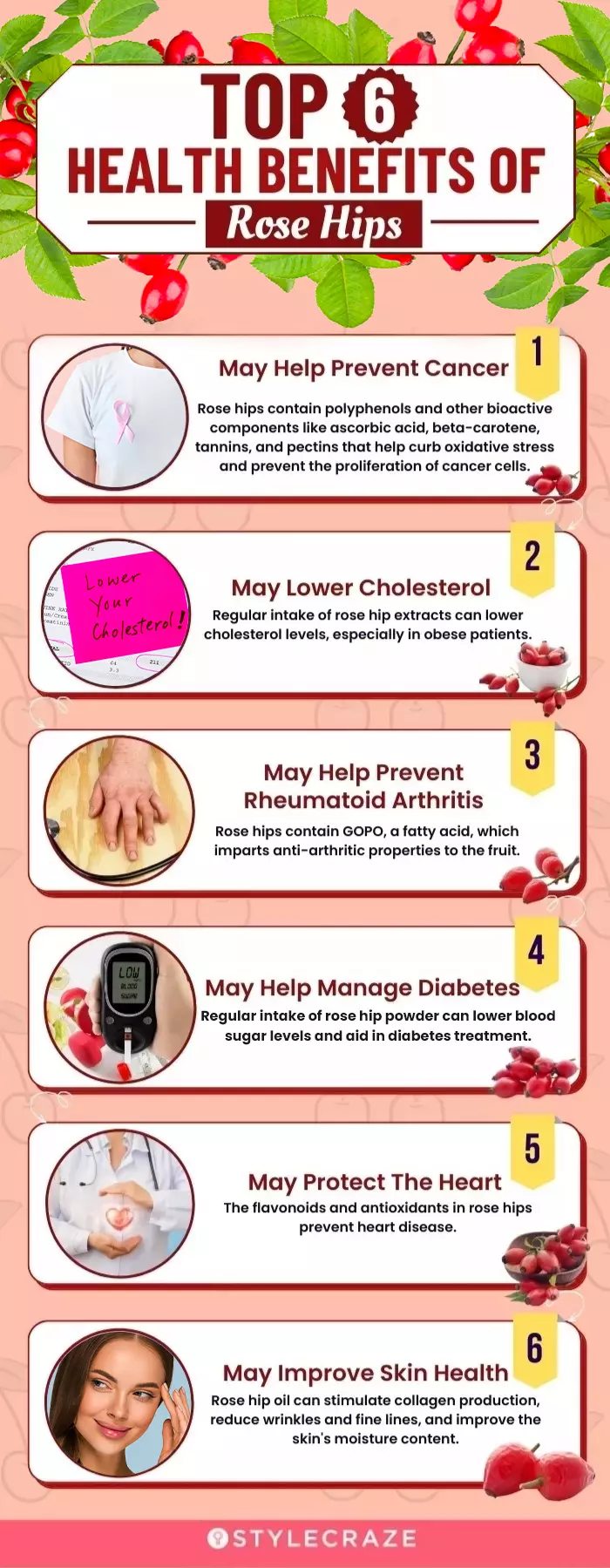
The benefits of rose hips can be attributed to their vitamin C, phenols, lycopene, and ellagic acid. These can help in cancer prevention, improve cardiovascular health, and potentially prevent other chronic diseases. They also help lower cholesterol levels, aid in detoxification and immunity and metabolism-boosting, and improve respiratory health. Other rosehips benefits include treating urinary tract infections and managing diabetes. However, overconsumption of rose hips may trigger headaches, dizziness, heartburn, diarrhea, and stomach cramps. Hence, consume them in moderation. You can also try any of the recipes mentioned above to include rosehips in your diet.
Frequently Asked Questions
Does rosehip help you sleep?
Yes, rosehip promotes sleep improvement. Feder says, “Rosehip can most definitely help you sleep. This is because it contains two compounds that can help improve sleep. They include GABA and theanine. Both of these compounds are amino acids that promote relaxation and contain potential sleep-inducing properties.”
Does rosehip have caffeine?
“Both rose hips, and rose hip tea are naturally caffeine free. If you are trying to avoid or limit caffeine in your diet, then rosehip and/or rose hip tea is a great addition to your diet.”, says Jesse Feder.
What does rosehip taste like?
Unlike the name suggests, the fruit doesn’t taste like roses. It tastes tangy.
Does rosehip oil cause acne or trigger breakouts?
Though the vitamin C in rosehip replenishes the skin, it can be too stimulating for skin prone to acne. Hence, use it on alternate days to avoid breakouts.
Is rosehip oil good for sunburn?
Yes, it is. You can apply the oil to sunburned skin.
Are rose hip seeds edible?
Yes. Certain reports say that they might contain very little amount of cyanide. And one needs to consume unrealistic amounts of the seeds to have any lethal effects.
How do you dry rose hips?
Very simple. Wash the rose hips and dry them on a newspaper in the sun. If the weather is not conducive, you can use a food dehydrator.
What is the relation between rose hip and hibiscus tea?
No specific relation as such. Except that the two are naturally sour and offer a range of health benefits.
Can you be allergic to rose hips?
Though rare, rosehip dust may cause allergic reactions in some people and may lead to asthma.
Illustration: Amazing Health Benefits Of Rose Hips
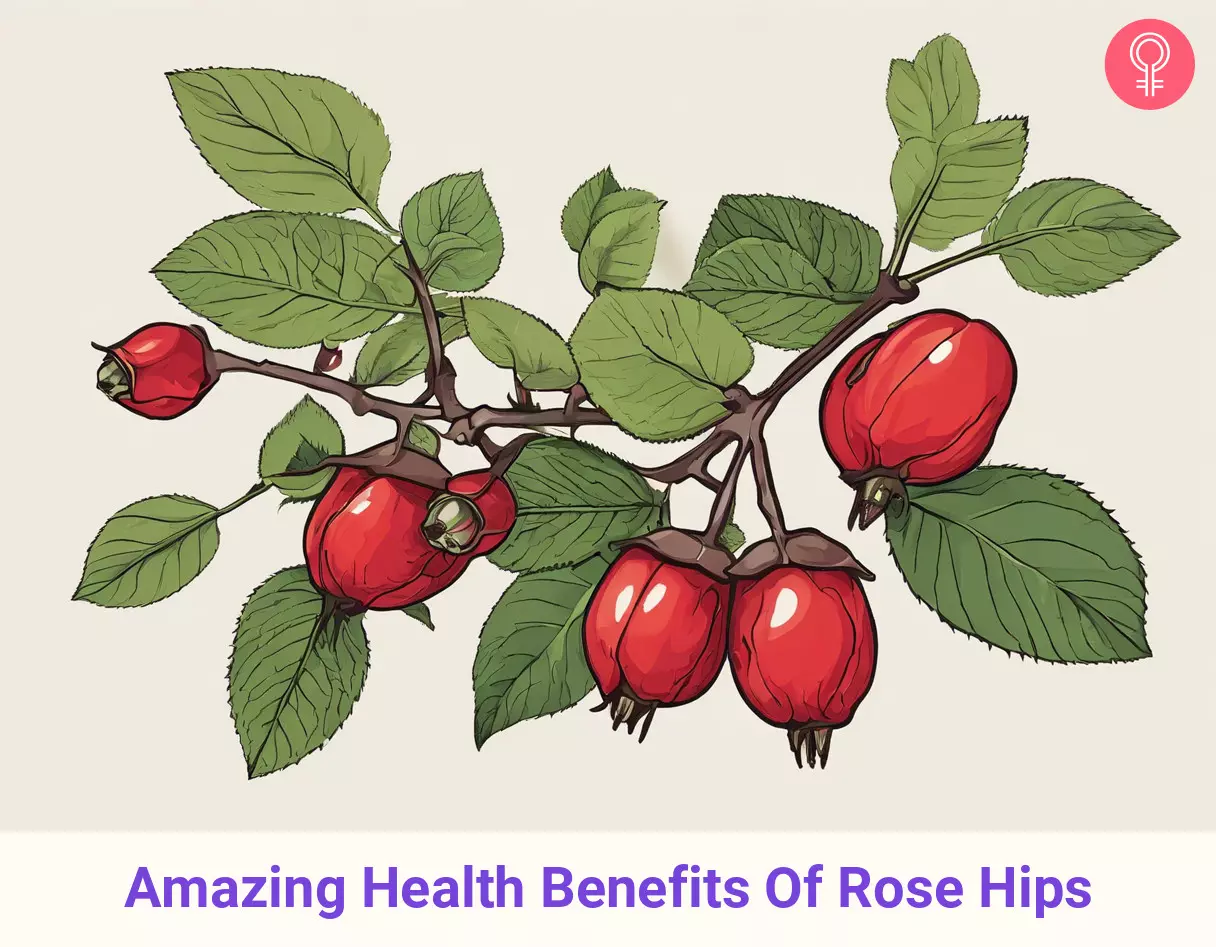
Image: Stable Diffusion/StyleCraze Design Team
Explore the dangers of overconsuming rose hips. Learn in detail how they negatively affect your body and make an informed decision by checking out this video.
Personal Experience: Source
StyleCraze's articles are interwoven with authentic personal narratives that provide depth and resonance to our content. Below are the sources of the personal accounts referenced in this article.
i. Candied rosehips,https://arecipeforgluttony.wordpress.com/2013/11/14/candied-rosehips/
References
Articles on StyleCraze are backed by verified information from peer-reviewed and academic research papers, reputed organizations, research institutions, and medical associations to ensure accuracy and relevance. Read our editorial policy to learn more.
- Rosehip – an evidence based herbal medicine for inflammation and arthritis
https://pubmed.ncbi.nlm.nih.gov/22762068/ - Rose Hip
https://www.drugs.com/npc/rose-hip.html - Rosehip (Rosa canina) extracts prevent AKT and MAPK-mediated cell proliferation in triple negative breast cancer cells
https://faseb.onlinelibrary.wiley.com/doi/10.1096/fasebj.31.1_supplement.775.18 - Effect of rosehip (Rosa canina L.) phytochemicals on stable free radicals and human cancer cells.
https://pubmed.ncbi.nlm.nih.gov/22083314/ - Rosa canina Extracts Have Antiproliferative and Antioxidant Effects on Caco-2 Human Colon Cancer
https://pubmed.ncbi.nlm.nih.gov/27467555/ - Therapeutic Applications of Rose Hips from Different Rosa Species
https://pmc.ncbi.nlm.nih.gov/articles/PMC5485961/ - Erythrocyte Antioxidant Protection of Rose Hips (Rosa spp.)
https://pmc.ncbi.nlm.nih.gov/articles/PMC3399354/ - Daily intake of rosehip extract decreases abdominal visceral fat in preobese subjects: a randomized double-blind placebo-controlled clinical trial
https://pmc.ncbi.nlm.nih.gov/articles/PMC4358417/ - Plant Products in Herbal Teas: Contraindications of Use
https://wwura.wwu.edu/plant-products-herbal-teas-contraindications-use - Natural cures for breast cancer treatment
https://pmc.ncbi.nlm.nih.gov/articles/PMC4881189/ - [Evaluation of the effectiveness of an oil extract of rosehip in the prevention of epithelitis due to radiotherapy in patients with head and neck cancer]
https://pubmed.ncbi.nlm.nih.gov/26996043/ - Effect of Rosehip (Rosa Canina) Extracts on Human Brain Tumor Cell Proliferation and Apoptosis
https://www.researchgate.net/publication/234107341_Effect_of_Rosehip_Rosa_Canina_Extracts_on_Human_Brain_Tumor_Cell_Proliferation_and_Apoptosis - The Effects of Lycopene on Your Health
https://www.ndsu.edu/pubweb/chiwonlee/plsc211/student%20papers/articles04/Melissa%20Welter/mwelter.htm - Daily dose of rosehip extract could help cut heart disease by lowering blood pressure and cholesterol levels
https://www.dailymail.co.uk/health/article-2087820/Daily-dose-rosehip-extract-help-cut-heart-disease-lower-blood-pressure-reduce-cholesterol.html - Recent advances and insights into the bioactive properties and applications of Rosa canina L. and its by-products
https://pmc.ncbi.nlm.nih.gov/articles/PMC11101839/ - Vitamin C in Disease Prevention and Cure: An Overview
https://pmc.ncbi.nlm.nih.gov/articles/PMC3783921/ - Foods Indigenous to the Western Hemisphere
https://aihd.ku.edu/foods/rosehips.html - Loss of food nutrients orchestrated by cooking pots: a common trend in developing world
https://pmc.ncbi.nlm.nih.gov/articles/PMC8249525/ - Interaction of vitamin C and iron
https://pubmed.ncbi.nlm.nih.gov/6940487/ - Rosehip
https://www.versusarthritis.org/about-arthritis/complementary-and-alternative-treatments/types-of-complementary-treatments/rosehip - Supplement and Herb Guide for Arthritis Symptoms
https://www.arthritis.org/health-wellness/treatment/complementary-therapies/supplements-and-vitamins/supplement-and-herb-guide-for-arthritis-symptoms - Rose-hip extract pills ‘slash the pain of arthritis by 90 per cent’
https://www.express.co.uk/life-style/health/459297/Rose-hip-extract-pills-slash-the-pain-of-arthritis-by-90-per-cent - Rose-hips ’could treat rheumatoid arthritis’
https://www.telegraph.co.uk/news/uknews/1554865/Rose-hips-could-treat-rheumatoid-arthritis.html - Rosehip – an evidence based herbal medicine for inflammation and arthritis
https://pubmed.ncbi.nlm.nih.gov/22762068/ - Rose hip exerts antidiabetic effects via a mechanism involving downregulation of the hepatic lipogenic program
https://pubmed.ncbi.nlm.nih.gov/20959531/ - Dietary rose hip exerts antiatherosclerotic effects and increases nitric oxide-mediated dilation in ApoE-null mice
https://pubmed.ncbi.nlm.nih.gov/28399420/ - The anti-inflammatory properties of rose-hip
https://pubmed.ncbi.nlm.nih.gov/17657447/ - Review of Anti-Inflammatory Herbal Medicines
https://pmc.ncbi.nlm.nih.gov/articles/PMC4877453/ - A Novel Rose Hip Preparation with Enhanced Anti-Inflammatory and Chondroprotective Effects
https://pmc.ncbi.nlm.nih.gov/articles/PMC4211164/ - An Initiative to Increase Knowledge of and Monitor Changes in Species of Temperate Climbing Plants
https://climbers.lsa.umich.edu/?p=490 - Dietary fibre in gastrointestinal health and disease
https://pubmed.ncbi.nlm.nih.gov/33208922/ - Effects of rose hip intake on risk markers of type 2 diabetes and cardiovascular disease: a randomized double-blind cross-over investigation in obese persons
https://pmc.ncbi.nlm.nih.gov/articles/PMC3343291/ - Can Rosehip Oil Give You Supermodel Skin?
https://www.foxnews.com/lifestyle/can-rosehip-oil-give-you-supermodel-skin - Inhibitory effect of rose hip (Rosa canina L.) on melanogenesis in mouse melanoma cells and on pigmentation in brown guinea pigs
https://pubmed.ncbi.nlm.nih.gov/21389613/ - The effectiveness of a standardized rose hip powder containing seeds and shells of Rosa canina on cell longevity skin wrinkles moisture and elasticity
https://pmc.ncbi.nlm.nih.gov/articles/PMC4655903/ - Dietary rose hip exerts antiatherosclerotic effects and increases nitric oxide-mediated dilation in ApoE-null mice☆☆☆
https://www.sciencedirect.com/science/article/pii/S0955286316301887?via=ihub - Rose Hip
https://medlineplus.gov/druginfo/natural/839.html
Read full bio of Jesse Feder
- Jesse Feder, RDN/LDN, is a Clinical Dietitian at the Memorial Regional Hospital. He is also a certified by the American College of Sports Medicine as a personal trainer (ACSM-CPT) and the National Strength and Conditioning Association as a Certified Strength and Conditioning Specialist (NSCA-CSCS).
 Jesse Feder, RDN/LDN, is a Clinical Dietitian at the Memorial Regional Hospital. He is also a certified by the American College of Sports Medicine as a personal trainer (ACSM-CPT) and the National Strength and Conditioning Association as a Certified Strength and Conditioning Specialist (NSCA-CSCS).
Jesse Feder, RDN/LDN, is a Clinical Dietitian at the Memorial Regional Hospital. He is also a certified by the American College of Sports Medicine as a personal trainer (ACSM-CPT) and the National Strength and Conditioning Association as a Certified Strength and Conditioning Specialist (NSCA-CSCS).
Read full bio of Ravi Teja Tadimalla
Read full bio of Arshiya Syeda
Read full bio of Sindhu Koganti










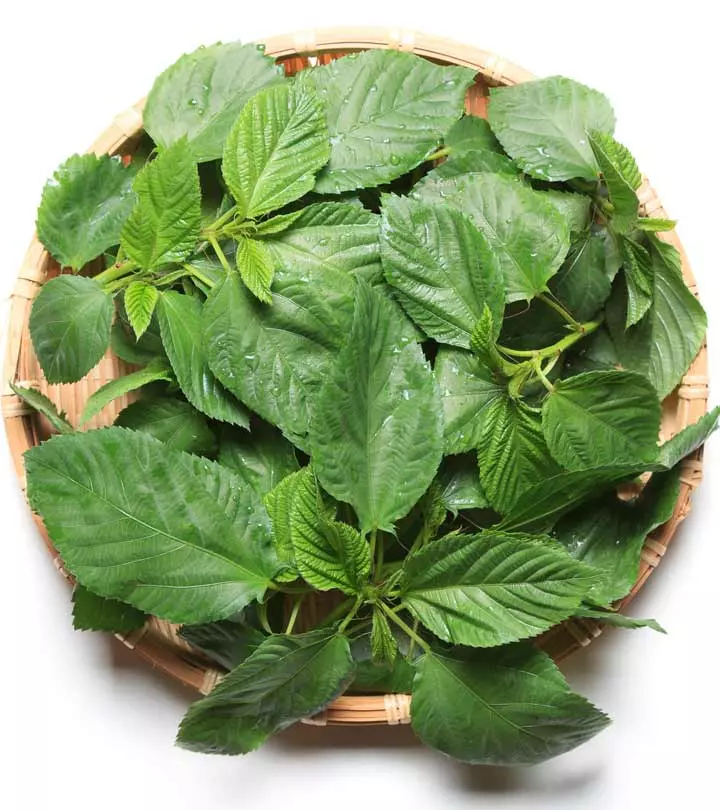


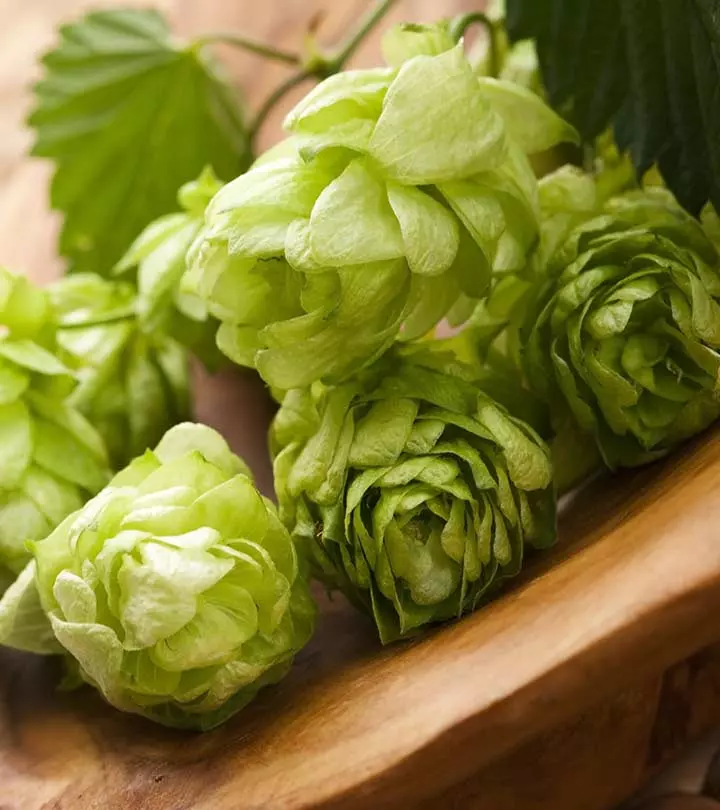


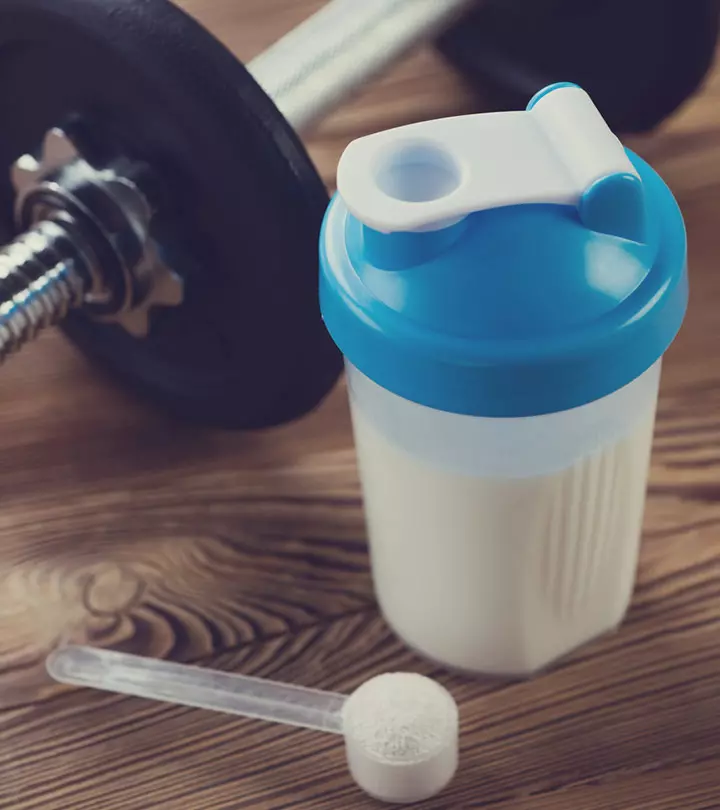
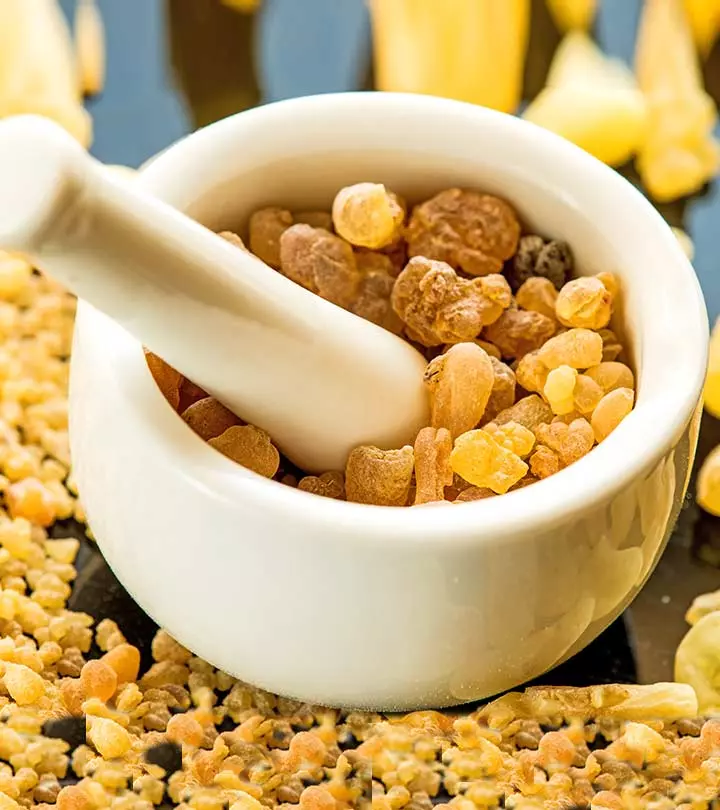


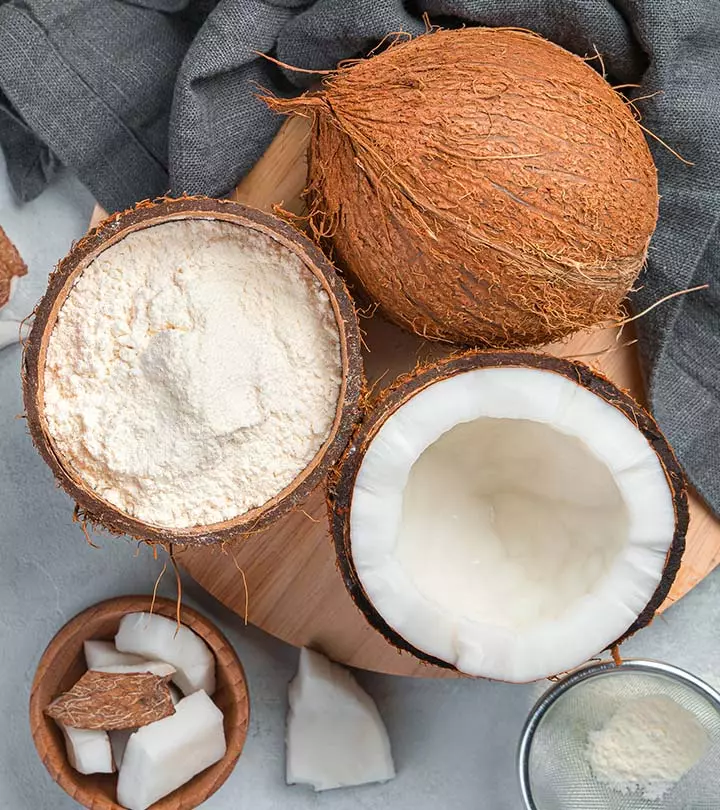


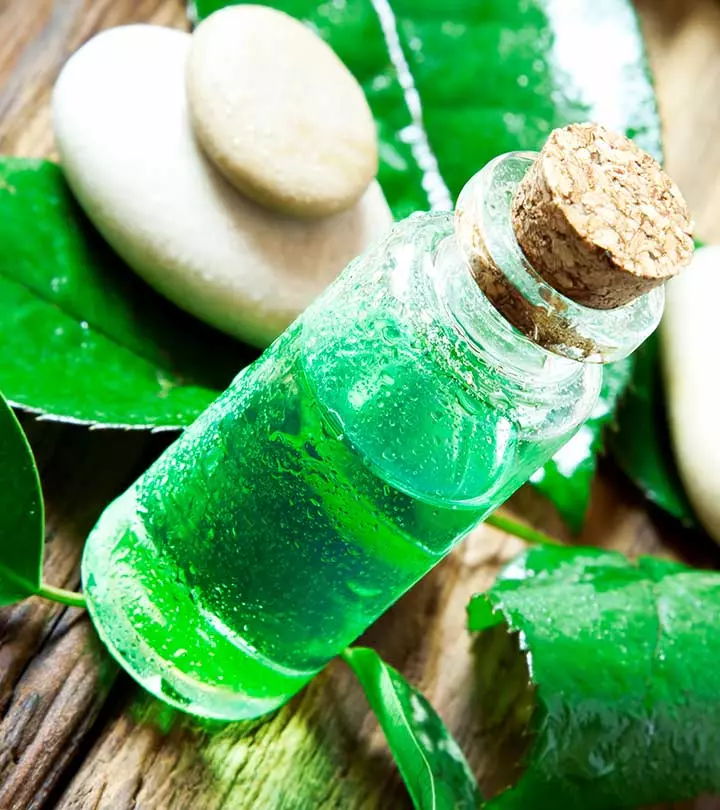



Community Experiences
Join the conversation and become a part of our empowering community! Share your stories, experiences, and insights to connect with other beauty, lifestyle, and health enthusiasts.